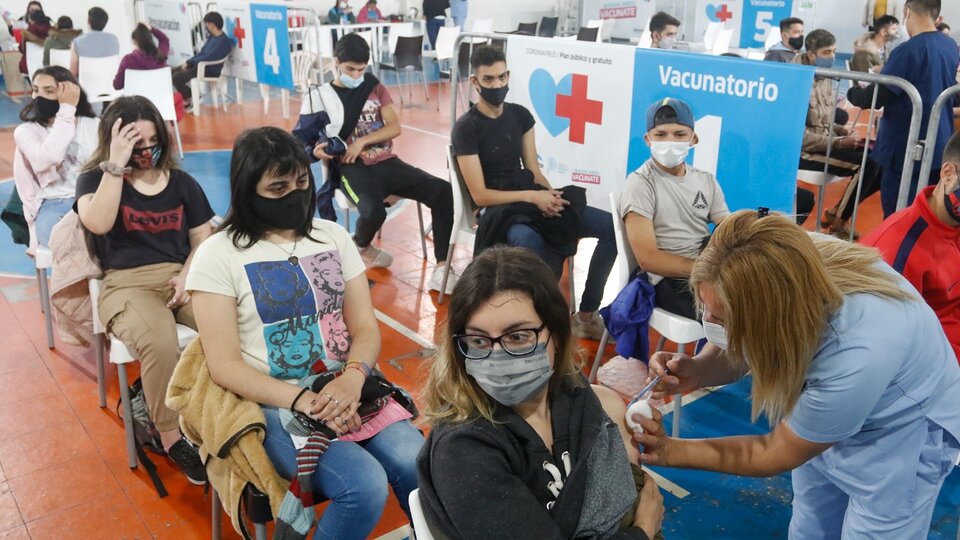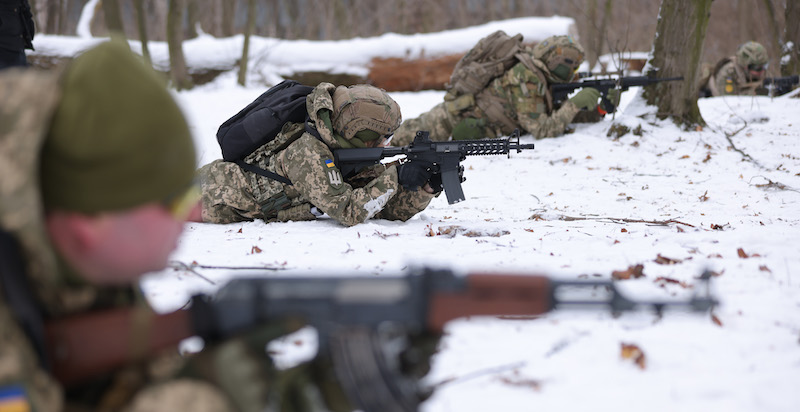While the Ómicron is raging with record numbers of infections, the debate around the mandatory nature of the vaccine against Covid 19 begins to spread Worldwide and Argentina is not exempt. In the last week, two initiatives that propose to incorporate this vaccine in the National Vaccination Calendar —a government bill and a document signed by more than 1,300 specialists– activated the discussion in the national territory. The positions in the scientific community are not unequivocal and, while some support the initiative to make vaccines mandatory for those over 18 years of age in order to promote the inoculation plan for the entire population, others warn that it is better to wait until the vaccines pass the emergency use approval stage.
The debate puts a wedge, even within the ruling party itself, since The Ministry of Health of the Nation warns that it is not yet the time to move towards mandatory vaccination. In the Province of Buenos Aires, meanwhile, Minister Nicolás Kreplak considers that the conditions are given to move forward with its mandatory nature, although he considers that the discussion should take place in the Congress.
Beyond the discrepancies, all the referents consulted by Page 12 They agreed to highlight the safety and efficacy of the vaccines that, throughout the country, have already inoculated 75 percent of the population with the complete scheme. The discussion about the obligation, ultimately, points to the percentage that still resists.
Complaints for the obligation
The bill presented by the deputies of the Frente de Todos, Juan Carlos Alderete and Verónica Caliva, unleashed the debate. “Be incorporated into the National Vaccination Calendar, free and mandatory, the complete vaccination schedule against SARS CoV-2 for all people over 18 years of age who live in the Argentine Republic according to the priorities and programs set by the Ministry of Health of the Nation”, maintains in its first article the initiative that, although it is supported by other legislators of the ruling party, does not have the support of the entire bloc or that of Casa Rosada.
“The mandatory nature of vaccines is not part of the Executive’s agenda, nor is it part of that of the ruling bloc in Congress.“, clarified, emphatically, the presidential spokeswoman Gabriela Cerruti. The project, however, “is a contribution that we make to add to the discussion that exists around the management of the pandemic, a response to the anti-vaccine sectors that systematically opposed to each of the government’s measures,” Caliva explained to this newspaper. “Our only goal is to add to the debate,” insisted the national deputy.
“I think that from a bioethical and health point of view, the conditions are in place for it to be mandatory. But given the level of social significance that these decisions have in the context of the pandemic, it seems to me that the discussion should take place in an environment of democratic debate. It is not enough for a committee of experts from the Ministry to define what to do, the debate has to take place in the National Congress,” said the Buenos Aires Minister of Health, Nicolás Kreplak, to Page 12. The minister assured that he had no doubts about the benefit of the vaccine – “the one who is vaccinated has 36 fewer chances of dying than one who has not been vaccinated” -, but he was suspicious of the possibility that the “belligerent overrepresentation against vaccines of the networks and the media” generated a certain violent backlash against vaccination. Or that the government decision ended up “getting into the crack.”
The vaccine and the “crack”
“The decision could be used by some media or political sectors to generate more violence or fear. There is a percentage of the population that can become anxious and I believe that, in the process of public debate, listening to the explanations of the experts, people who may have doubts can become convinced. And so we get more people to be vaccinated, which is what we want to do,” explained Kreplak, making a small parallel with what was the parliamentary debate for the legalization of abortion.
“There is a conceptual issue here that, with the evidence we have that shows us that getting vaccinated protects you 10 or 20 times more from having a severe infection or death, it shows us that the vaccine should be incorporated into the vaccination schedule. But, on the other On the other hand, there is the debate about whether, by incorporating it into the calendar, we are going to get that 10-12 percent of the adult population that did not vaccinate to do so. Well, the conclusion with the sanitary pass was that yes, it worked,” he analyzed the biochemist and immunologist from Conicet, Jorge Geffner. “Vaccination has to be mandatory, at least for the adult population. We are already seeing how the debate is beginning to take place in Europe, it is being discussed in the German parliament; Italy and Austria already have it. We have to raise the discussion, everywhere they are doing it“, he reflected.
“There are several of us who have raised the issue of mandatory in the advisory committee of the Buenos Aires Ministry of Health. It is imperative that children are all vaccinated before the start of class,” added, in turn, the scientific reference and molecular biologist, Alberto Kornblihtt. According to data from the Ministry of Health, 47 percent of children between 3 and 11 years old completed their vaccination schedule, while 68 percent of adolescents between 12 and 17 have both doses. “All this has to do with the social responsibility of vaccination. Some talk about individual freedoms as if not getting vaccinated affects only one person and does not harm the rest. The only way to beat the virus is by getting vaccinated,” he insisted.
The position of the Ministry of Health
In the Ministry of Health of the Nation, meanwhile, they use the numbers of the vaccination plan to justify that, for now, the strategy that is being applied is effective. Indeed, 86 percent of those over 18 years of age are vaccinated with the complete schedule (more than 95 percent, on the other hand, already have at least one dose).
“The moment does not ask for it. We have a huge adherence, since the beginning of the year we have managed to start more than a million vaccination schemes for people over 18 years of age,” said a source close to Minister Carla Vizzotti., which also highlighted the impact of measures such as the health pass. “The epidemiological situation is still not clear, nor is the duration of immunity and the need for reinforcements to define, nor what variant is going to be the one that will remain as seasonal or endemic to decide which are the groups to vaccinate and if It is necessary to incorporate them into the calendar with obligation,” he added.
“Incorporation into the vaccination schedule is something that is going to happen at some point, but I don’t think the time is now. People who want to be vaccinated are already getting vaccinated and those who don’t want to be vaccinated because they are recalcitrant against vaccines don’t. they are going to do because it is included in the Vaccination Schedule. Rather than making it mandatory, what we have to do is go and convince those in the middle, who due to misinformation or misinformation are not entirely sure,” said the infectologist and founder of Fundación Huésped, Pedro Cahn.
Along similar lines to that held by the national government, Pedro Cahn questioned the practical effect of making it mandatory, although he also emphasized another point: the fact that the vaccine is still in the emergency approval stage. “I have no doubts about its effectiveness, but we have to wait until it passes the emergency use authorization stage and is approved by the regulatory authority.“, he maintained. The infectologist was not the only one to highlight this point, but it is something that even from Together for Change is being highlighted. “Although these vaccines have been shown to be safe and effective, they have emergency approval in the context of the pandemic, not yet for regular use. To include it in the calendar, longer-term evidence is needed,” former Health Secretary Adolfo Rubinstein told this newspaper.
The document of the 1300 scientists
Almost simultaneously with the presentation of the bill that sought to include the Covid vaccine in the National Vaccination Calendar, a document signed by more than 1,300 professionals from Science and Health began to circulate, demanding the same from the national government. “In order to safeguard the lives of all the inhabitants of our beloved Argentina, we declare ourselves in favor of the incorporation into the National Vaccination Calendar, free and mandatory, of the complete vaccination scheme against SARS-CoV- 2”, maintains the document signed by figures such as the intensivist Arnaldo Dubin, the infectologist Tomás Orduna, the doctor Jorge Rachid, among many others.
“We are facing a brutal increase in infections that is crossed by two fallacious arguments that maintain that Ómicron causes a mild disease and that we are entering an endemic phase of the disease. Well, Ómicron can cause a serious and fatal disease and we are in a pandemic,” Arnaldo Dubin told this newspaper, arguing that, in this context, it is urgent to improve the vaccination rate. “In the same way that other vaccines are mandatory, the same should happen with Covid. This is a very important issue for which there will have to be a broad and consensual debate,” he concluded.
–


